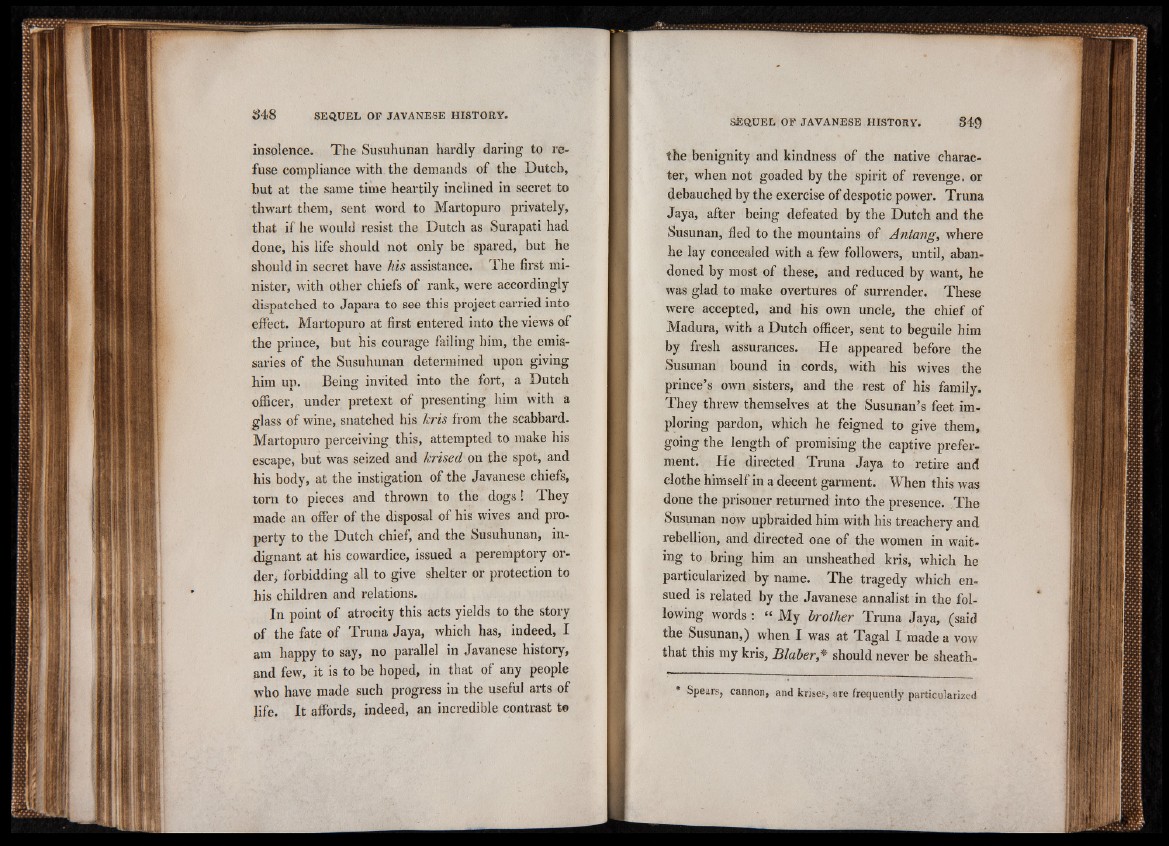
insolence. The Susuhunan hardly daring to refuse
compliance with the demands of the Dutch,
but at the same time heartily inclined in secret to
thwart them, sent woi’d to Martopuro privately,
that if he would resist the Dutch as Surapati had
done, his life should not only be spared, but he
should in secret have his assistance. The first minister,
with other chiefs of rank, were accordingly
dispatched to Japara to see this project carried into
effect, Martopuro at first entered into the views of
the prince, but his courage failing him, the emissaries
of the Susuhunan determined upon giving
him up. Being invited into the fort, a Dutch
officer, under pretext of presenting him with a
glass of wine, snatched his kris from the scabbard.
Martopuro perceiving this, attempted to make his
escape, but was seized and lerised on the spot, and
his body, at the instigation of the Javanese chiefs,
torn to pieces and thrown to the dogs t They
made an offer of the disposal of his wives and property
to the Dutch chief, and the Susuhunan, indignant
at his cowardice, issued a peremptory order*
forbidding all to give shelter or protection to
his children and relations.
In point of atrocity this acts yields to the story
of the fate of Truna Jaya, which has, indeed, I
am happy to say, no parallel in Javanese history,
and few, it is to be hoped, in that of any people
who have made such progress in the useful arts of
life. It affords, indeed, an incredible contrast t®
the benignity and kindness of the native character,
when not goaded by the spirit of revenge, or
debauched by the exercise of despotic power. Truna
Jaya, after being defeated by the Dutch and the
Susunan, fled to the mountains of Antang, where
he lay concealed with a few followers, until, abandoned
by most of these, and reduced by want, he
was glad to make overtures of surrender. These
were accepted, and his own uncle, the chief of
Madura, with a Dutch officer, sent to beguile him
by fresh assurances. He appeared before the
Susunan bound in cords, with his wives the
prince’s own. sisters, and the rest of his family.
They threw themselves at the Susunan’s feet imploring
pardon, which he feigned to give them,
going the length of promising the captive preferment.
He directed Truna Jaya to retire and
clothe himself in a decent garment. When this was
done the prisoner returned into the presence. The
Susunan now upbraided him with his treachery and
rebellion, and directed one of the women in waiting
to bring him an unsheathed kris, which he
particularized by name. The tragedy which ensued
is related by the Javanese annalist in the following
words : “ My brother Truna Jaya, (said
the Susunan,) when I was at Tagal I made a vow
that this my kris, Blaber,* should never be sheath*
Spears, cannon, and krises, are frequently particularized